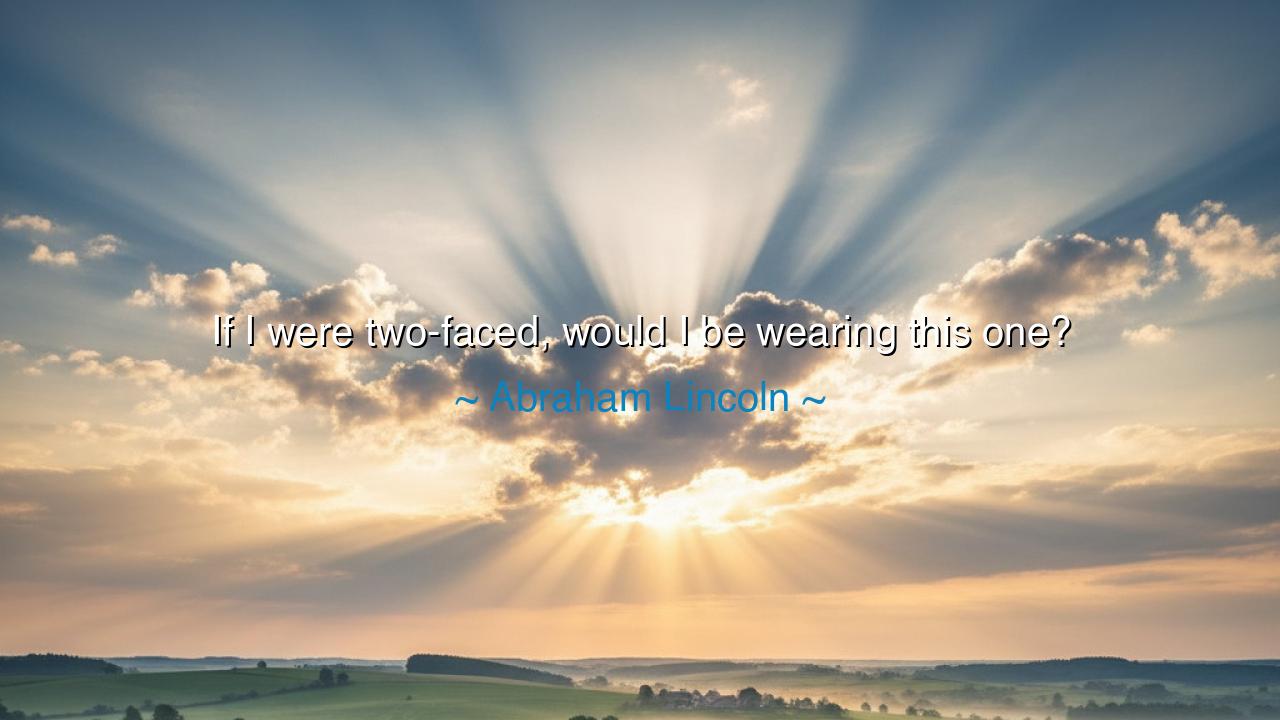
If I were two-faced, would I be wearing this one?






“If I were two-faced, would I be wearing this one?” — Abraham Lincoln
There are words that flash like lightning — brief, dazzling, and revealing the whole landscape of truth in an instant. This line by Abraham Lincoln, spoken in jest yet rooted in the soil of humility, is one such lightning strike. When a critic accused him of duplicity, of playing both sides of politics, Lincoln replied with his trademark wit: “If I were two-faced, would I be wearing this one?” The laughter it provoked was not mere amusement — it was liberation, the kind that comes when truth is spoken with disarming honesty. Beneath its humor lies a profound lesson: that sincerity, even when clothed in imperfection, is more honorable than deceit wrapped in beauty.
The origin of this quote comes from one of Lincoln’s public addresses during his presidency — a time when the nation was torn apart by civil war, when every word from his lips was weighed and measured by friend and foe alike. Lincoln, weary from accusation and pressure, responded not with anger but with humor — the shield of the wise. His remark, humble and self-deprecating, reflected both his humanity and his wisdom. He knew the value of laughter as a balm for bitterness. But beneath the jest lay a moral declaration: honesty, though imperfect, is the crown of integrity. In mocking his own appearance, Lincoln transformed criticism into truth and truth into strength.
The ancients would have recognized in this moment the spirit of Socrates, who disarmed his opponents not through fury, but through irony — laughter as a weapon of wisdom. Lincoln’s wit was not cruelty but clarity, born from a heart that refused hypocrisy. To be “two-faced,” as he implied, is to live without honor, to wear one mask for the world and another for oneself. Yet he, in his humility, wore no mask. His rugged face — lined, weary, homely — became a symbol of authenticity. He reminded the people that truth does not always wear beauty’s face, but it shines brighter than false charm ever could.
In his time, Lincoln was accused of being slow, awkward, and plain. Yet, like the great men of antiquity, he transformed these supposed weaknesses into instruments of greatness. His honesty, his refusal to flatter or pretend, became his strength. The remark about being “two-faced” was more than a joke; it was an assertion of moral courage. He was saying, in essence, I have only one face, one conscience, one truth — it may not be handsome, but it is mine. Such a spirit has been rare in every age, and rarer still in one burdened with power. His humor sanctified humility; it made truth approachable, even lovable.
Consider the Roman general Cincinnatus, who, after saving his nation, returned quietly to his farm, refusing the pomp and title of ruler. Like Lincoln, he wore but one face — the same in power as in simplicity. These men remind us that leadership rooted in integrity, not pretense, outlives its own age. Lincoln’s jest, spoken in laughter, carries the same eternal message: that those who lead by truth need no disguise, for the light within them is brighter than any mask they might wear. The face of honesty may be weathered by toil, scarred by struggle, but it is radiant with peace.
And yet, Lincoln’s quote carries a gentler wisdom as well — the art of self-acceptance. In a world where men strive to hide their flaws behind polished words and perfect masks, he embraced his own imperfection. By mocking his looks, he showed that one’s worth lies not in appearance but in virtue. There is beauty in truth, even when truth wears rough features. The man who can laugh at himself disarms pride, envy, and vanity — those thieves of inner peace. For to laugh at oneself is to stand above one’s weakness, not beneath it.
So, my child, take this lesson into your heart: wear but one face in this world — your own. Let it be honest, even if it is plain; let it be kind, even if it is weary. Do not seek to charm by deception, nor to please by falsehood. For every mask you wear will one day grow heavy, and the soul beneath will suffocate. Better to bear the face of truth — scarred, smiling, unadorned — than to live behind the silk curtain of deceit. Remember Lincoln’s wisdom: the man who wears but one face fears nothing, for he has nothing to hide.
And when the world mocks you — for your flaws, your looks, your simplicity — laugh as Lincoln did. Let your laughter be the song of freedom, the sound of a soul that needs no disguise. For those who walk in honesty, even through storms, are the ones who leave footprints of light. Their truth, though humble, will outlast every polished lie. And in that, the face of truth — yours and his — will shine forever.






AAdministratorAdministrator
Welcome, honored guests. Please leave a comment, we will respond soon